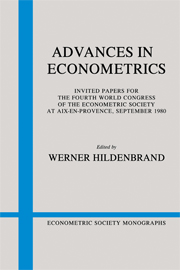Book contents
- Frontmatter
- 1 Qualitative response models
- 2 The identification problem in econometric models for duration data
- 3 The effects of time in economic experiments
- 4 Some recent developments on the distributions of single-equation estimators
- 5 Best uniform and modified Padé approximants to probability densities in econometrics
- 6 Identifiability and problems of model selection in econometrics
- 7 Causality, exogeneity, and inference
- 8 Generating mechanisms, models, and causality
- 9 Comparing alternative asymptotically equivalent tests
- 10 Conflict among testing procedures in a linear regression model with lagged dependent variables
- 11 Macroeconomic modeling based on econometric and simulation models for the Polish economy
2 - The identification problem in econometric models for duration data
Published online by Cambridge University Press: 05 January 2013
- Frontmatter
- 1 Qualitative response models
- 2 The identification problem in econometric models for duration data
- 3 The effects of time in economic experiments
- 4 Some recent developments on the distributions of single-equation estimators
- 5 Best uniform and modified Padé approximants to probability densities in econometrics
- 6 Identifiability and problems of model selection in econometrics
- 7 Causality, exogeneity, and inference
- 8 Generating mechanisms, models, and causality
- 9 Comparing alternative asymptotically equivalent tests
- 10 Conflict among testing procedures in a linear regression model with lagged dependent variables
- 11 Macroeconomic modeling based on econometric and simulation models for the Polish economy
Summary
Econometric models for the analysis of duration data have recently come into widespread use in economics. Recent studies of employment and nonemployment (Flinn & Heckman, 1982a; Heckman & Borjas, 1980), unemployment (Flinn & Heckman, 1982b; Kiefer & Neumann, 1981; Lancaster & Nickell, 1980; Toikka, 1976), fertility (Gomez, 1980), strike durations (Kennan, 1980; Lancaster, 1972), and infant mortality (Harris, 1980) have estimated econometric models for durations of events. All of these models have two features in common: they are nonlinear in an essential way, and the methods used to secure estimates of structural models require strong a priori assumptions about the functional forms of estimating equations. Most of these studies have also assumed that the distributions of the unobserved variables in these models are of a simple parametric form. The choice of these distributions usually is justified on the basis of familiarity, ease of manipulation, and considerations of computational cost.
Because of the novelty of the new methods, it is not yet widely appreciated that empirical estimates obtained from these models are extremely sensitive to the choice of a priori identifying assumptions. This chapter will demonstrate this point and present an analysis of identification problems in models for the analysis of duration data. We shall demonstrate that current practice overparameterizes econometric duration models.
- Type
- Chapter
- Information
- Advances in Econometrics , pp. 39 - 78Publisher: Cambridge University PressPrint publication year: 1983
- 7
- Cited by



